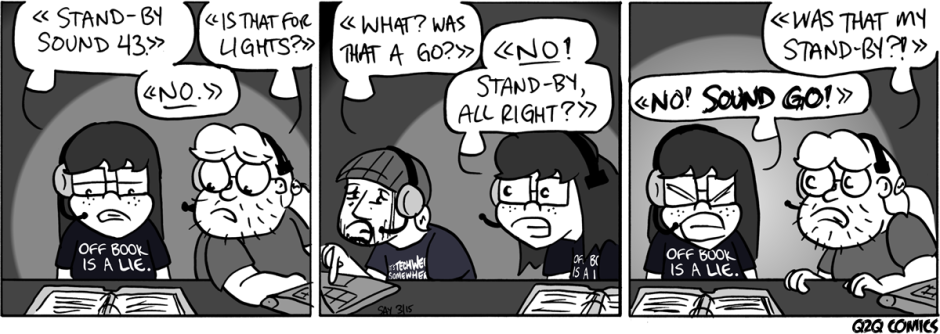Yes indeed, a HUGE pet peeve is when cues are called "Go Lights" or such. Then they wonder why the wrong thing goes, or doesn't go on time when multiple cues are standing by (mainly for the first time or one-offs or such, not an excuse).
Something I have always wondered. Why LX and why doesn't sound have a special title for there cues. Just curious.
Occasionally I've heard "SX", but its no real easier to say or interpret than "sound". Often Lights is called as "lights".
All comes down to preference.
I imagine (however don't recall for sure) that there is a list of short forms and such in the
wiki. I seem to recall one. Really what is important is that what name you use is
clear (easy to say and easy to differentiate).
Think of "Phonetic Alphabet" Radio codes, they are all chosen to be easy to hear so that if a radio transmission is patchy your message can still be interpreted. I grew up sailing so that kind of mindset with communication comes
clear. The words chosen for each letter of the phonetic alphabet are typically not found in normal conversation much and don't sound like each other so if you only hear part of the word you can know what letter was said.
A good example to hear would be something like:
"[talking boat name] to oncoming powered boat, [talking boat name] to oncoming powered boat, ALPHA, ALPHA, ALPHA, Diver in the water."
-> Alpha is the word for the letter "A", which is associated to "Diver in the water, keep well
clear at low speed." (Or when followed with numbers an azimuth or bearing).
Or when spelling something out "My name is Steven, Spelt SIERRA TANGO ECHO VICTOR ECHO NOVEMBER".
Imagine spelling something out to someone with words that rhymed? "Spelt Melt Art Rendezvous Tart", well you'd get the R but no guarantee that the person hearing you would spell SMART.
Either way we stick with what works, and to further
pick up on what I was just saying (yes totally on purpose) avoid saying things like "NO" when a
cue is standing by or someone may be expecting a
cue. "NO" sounds a lot like "GO". Actually not that long ago I had a
Stage Manager who was smart enough to say things like "Don't G. O." or whatever but accidentally after a
standby said "No!", I heard "Go!" and hurriedly executed the lighting
cue I was standing by on. No real harm done, but it sure looked like crap when the dancer was suddenly in black and the other side of the
stage got lit.
I guess all I am trying to say is that com traffic needs to be
clear. Chit chat can be just fine, and if something needs to be communicate it DO! But make sure when something important needs to be communicated it gets priority. I hate it when someone suddenly starts talking on com when you have a
cue coming up, or someone is trying to figure something out or whatnot.



